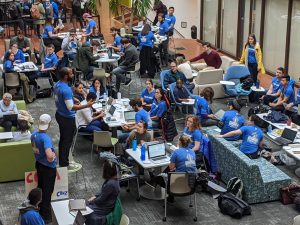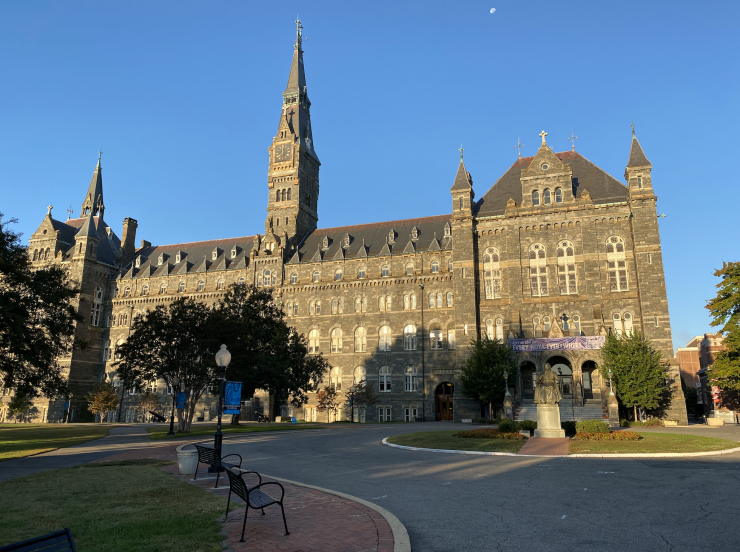A labor union of Georgetown University graduate students is seeking arbitration with the administration in a dispute over protections related to the COVID-19 pandemic.
The Georgetown Alliance of Graduate Employees (GAGE), the first union to represent Ph.D. and master’s students at the university, said the Georgetown administration has denied its contractual right to bargain.
GAGE secured a three-year contract with the university on May 1 after 13 months of negotiations. The agreement covers more than 1,000 workers and guarantees 2% annual raises for all graduate student assistants as well as health benefits and other rights.
But the agreement doesn’t guarantee protections such as paid sick leave for graduate workers who contract COVID-19, or remote work regardless of the employee’s location.
The administration said that GAGE does not have the right to bargain over the impact of the coronavirus. GAGE said on its website that leading up to the contract, “COVID-19 was itself not substantively discussed as a factor to consider when writing contract language,” and that at that time, neither side anticipated that the outbreak would worsen.
“We shouldn’t have to be putting our energy into asking an arbitrator to reaffirm our right to collective bargaining, but here we are,” said Jewel Tomasula, a doctoral candidate in biology and president of the union.
GAGE is affiliated with the American Federation of Teachers (AFT), which represents more than 32,000 graduate employees nationally.

For months, GAGE has pressed the university to sign a letter of agreement on COVID-19.
Separate from the contract, the letter of agreement would guarantee remote work for all graduate student employees regardless of location and provide sick leave to employees who contract the virus. The letter would also require the university to cover the cost of COVID-19 testing.
In July, university administrators and GAGE began “impact bargaining” sessions to set policies for the duration of the pandemic. As negotiations stalled, GAGE held two rallies in August to demand that the university guarantee health and economic protections for graduate student workers.

By September, the union announced it would seek arbitration.
An arbitrator from the American Arbitration Association (AAA) will make a decision. The AAA previously supervised the GAGE election in 2018.
GAGE is pursuing “expedited arbitration,” a faster process that would only consist of documents, as opposed to a series of hearings with witnesses.
We are preparing for arbitration in response to the Georgetown admin's disrespect for our union rights. We write this letter to ask you to join our call for a fair COVID-19 agreement. https://t.co/Vxp7KkvlUB
— GAGE (@WeAreGAGE) October 4, 2020
Ari Janoff, GAGE’s grievance officer, said the university has “cooperated fully” with the grievance process and will reply by Oct. 8. (Georgetown University did not respond to multiple requests for comment.)
“They indicated that their forthcoming response would agree to a documents-only arbitration,” said Janoff, a doctoral candidate in linguistics.
Daniel Solomon, vice president of GAGE and a doctoral candidate in government, said that universities have responded to the pandemic using different approaches.
“Many have unintended consequences for graduate workers that universities have not consulted them on,” Solomon said.
“There have been significant changes to university policy that we feel compel us to respond in the way that we have,” Solomon said.
In a statement published on Sept. 22 in the Georgetown Voice, a university spokesperson said, “Georgetown is currently responding to GAGE-AFT’s concerns through the grievance process and continues to make efforts to resolve this matter short of arbitration.”
Solomon said that GAGE expects to resolve the dispute through the arbitration process.
“We’re confident that the formal process that we have for resolving disputes with the university is adequate,” Solomon said.
Janoff said that GAGE will continue to advocate on behalf of graduate student workers even if the outcome is unfavorable.
“Regardless of the arbitrator’s decision, our next course of action will be to organize and ensure that the administration hears the concerns that graduate workers have about the impact of their policies on our health, safety, and livelihoods,” Janoff said.
GAGE President Jewel Tomasula said that while the pandemic poses obstacles for organizing in person, more graduate student workers are getting involved.
“Grad workers are seeing that we stand up for each other during a crisis, and a union is an effective structure for this,” she said.
Last month, more than 2,000 graduate student employees at the University of Michigan in Ann Arbor held a strike for eight days in opposition to the university’s proposed plans for reopening in the fall.
The COVID-19 pandemic has caused more students to organize nationwide, according to the National Center for the Study of Collective Bargaining in Higher Education and the Professions at Hunter College, City University of New York.
“The economic and health and safety crisis resulting from the pandemic has already led to increased collective action across the country by faculty, graduate students, and other campus workers,” said William A. Herbert, the center’s executive director.
Brad Sommer, president and CEO of the National Association of Graduate-Professional Students, said that “grad student workers were almost universally left out” of discussions about fall reopening plans.
“For a group that historically lacks agency on the campus but is absolutely essential to its success, this oversight, intentional or otherwise, was likely distressing,” said Sommer, a doctoral student in history at Carnegie Mellon University.















Add comment